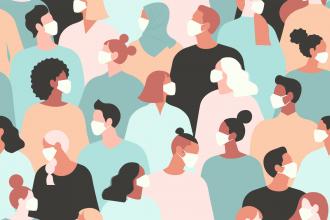Shortly after I started medical school, friends and family members began asking me questions about their health, as if my acceptance into medical school had granted me automatic knowledge to interpret lab tests, give opinions about prescription medications, and diagnose diseases. At first I was uncomfortable with these questions because I didn’t know the answers. As I progressed through medical school, my uncertainty in these situations diminished and I felt more confident in my answers, at least until COVID-19 appeared.
The COVID-19 pandemic has wreaked havoc throughout medical communities and the general population. With a plethora of information accessible online, conflicting evidence, and continually evolving knowledge, the task of making appropriate changes in behavior to ensure my own health, and that of others, has been daunting.
Again, family and friends ask me questions, as if a medical student has more insight into COVID-19 than they do. I felt helpless and uncertain when faced with these questions. I struggled to respond to questions about how to navigate everyday activities like shopping, cooking, and outdoor activities. What should they continue doing? What should they do differently? With so much information available, no one seemed to be answering people’s simple queries about everyday life.
As part of our medical school coursework, we participate in projects related to health care, and I came across an initiative from Dr Maureen Mayhew (a public health physician) and Dr Angeli Rawat (a global public health researcher). They were asking for medical students to help research and create evidence-informed advice for the public to address a gap they had identified in publicly available COVID-19 information. Finally, I felt that I wasn’t alone with my feelings of uncertainty. I joined their team along with Tori Spangehl, another medical student, and rapidly began reviewing journal articles and grey literature. Our aim was to synthesize available evidence into easy-to-read, practical guides for COVID-19 challenges in specific, everyday scenarios.
I’ve found this to be a challenging undertaking, even for four individuals with health care backgrounds. We have done our best to provide solutions based on available evidence, and when COVID-19-specific answers were hard to come by, we turned to fundamental public health principles. So far we have created nine infographics and tip sheets on the following subjects:
- Parenting
- Ride-sharing
- Food safety
- Apartment living
- Keeping your home safe
- Communication and physical distancing
- Outdoor activities
- Shopping
- Mental well-being
Our first guide was released on 8 April 2020 and I felt inspired by the positive response it received. So far, people in 35 countries have viewed our infographics and tips on the website. I look forward to creating additional tip sheets, and adapting existing ones as we head into phase 2 of the pandemic response.
I am also excited about our fun video about mask misuse, which highlights correct use of facial coverings. It was entertaining to identify incorrect and funny mask behavior but also rather frustrating.
During such unprecedented times we are all doing our best to stay safe in the midst of information overload. That is why I believe this initiative is so important. I hope it helps you in the same way it has helped me: to feel a little bit more certain in the face of uncertainty.
—Paige Dean, BSc
UBC MD candidate 2021
This post has not been peer reviewed by the BCMJ Editorial Board.



Hello Paige Dean - may I congratulate your most interesting approach and relevant, important info re: handling everyday activities in our current pandemic. There is a lot of "stuff" in this presentation and I may have missed one: the area of intimate physical behavior, otherwise called sexual behavior. This is an essential area to NOT neglect. I have a blog which superficially covers this topic (a blog is really only 500 words): Intimate relationships in the age of physical distancing".
Don't be afraid to explore intimate human topics. George Szasz CM,MD. Professor Emeritus, Dept.Psych (Sexual Medicine)